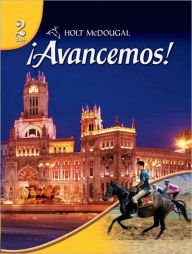
All Solutions
Page 234: Actividad 13
Let’s answer the following six questions to describe what happened.
**1**. Who came?
**2**. Who wanted to come, but couldn’t? Why?
**3**. What did the students bring? What did the teacher bring?
**4**. Did you search for a lost item? What object? Did you find it?
**5**. What did you find in the ruins?
**6**. What did everyone say next?
* We should review the information we have been studying in this unit.
* Let’s use the past tense at least once in each answer.
* Let’s use the vocabulary and grammar that we have studied and memorized.
**1**. **Español**: **Vinieron** mis compañeros de clases.
**English**: My classmates **came** (on the trip).
Let’s answer the following six questions to describe what happened.
**1**. Who came?
**2**. Who wanted to come, but couldn’t? Why?
**3**. What did the students bring? What did the teacher bring?
**4**. Did you search for a lost item? What object? Did you find it?
**5**. What did you find in the ruins?
**6**. What did everyone say next?
* We should review the information we have been studying in this unit.
* Let’s use the past tense at least once in each answer.
* Let’s use the vocabulary and grammar that we have studied and memorized.
**2**. **Español**: Pablo y Marina **quisieron** venir, pero no **pudieron** porque ellos estaban enfermos.
**English**: Pablo and Marina **wanted** to come, but they **couldn’t** because they were sick.
Let’s answer the following six questions to describe what happened.
**1**. Who came?
**2**. Who wanted to come, but couldn’t? Why?
**3**. What did the students bring? What did the teacher bring?
**4**. Did you search for a lost item? What object? Did you find it?
**5**. What did you find in the ruins?
**6**. What did everyone say next?
* We should review the information we have been studying in this unit.
* Let’s use the past tense at least once in each answer.
* Let’s use the vocabulary and grammar that we have studied and memorized.
3. **Español**: Los estudiantes **trajeron** herramientas, libretas para hacer apuntes y un bolso guardar poner los artículos hallados. La profesora **trajo** una cámara, una libreta para hacer apuntes y un diccionario de español para enseñarnos los nombres de los objetos que encontramos.
**English**: The students brought tools, notebooks to take notes and a bag to store the found items. The teacher brought a camera, a notebook to take notes and a Spanish dictionary to teach us the names of the objects we found.
Let’s answer the following six questions to describe what happened.
**1**. Who came?
**2**. Who wanted to come, but couldn’t? Why?
**3**. What did the students bring? What did the teacher bring?
**4**. Did you search for a lost item? What object? Did you find it?
**5**. What did you find in the ruins?
**6**. What did everyone say next?
* We should review the information we have been studying in this unit.
* Let’s use the past tense at least once in each answer.
* Let’s use the vocabulary and grammar that we have studied and memorized.
**4**. **Español**: **Buscamos** vasijas antiguas perdidas, pero no **encontramos** ninguna.
**English**: We **searched for** lost ancient pots, but we **didn’t find** any.
Let’s answer the following six questions to describe what happened.
**1**. Who came?
**2**. Who wanted to come, but couldn’t? Why?
**3**. What did the students bring? What did the teacher bring?
**4**. Did you search for a lost item? What object? Did you find it?
**5**. What did you find in the ruins?
**6**. What did everyone say next?
* We should review the information we have been studying in this unit.
* Let’s use the past tense at least once in each answer.
* Let’s use the vocabulary and grammar that we have studied and memorized.
**5**. **Español**: **Encontramos** varias esculturas, algunos collares y una pintura muy antigua.
**English**: We **found** several sculptures, some necklaces, and a very old painting.
Let’s answer the following six questions to describe what happened.
**1**. Who came?
**2**. Who wanted to come, but couldn’t? Why?
**3**. What did the students bring? What did the teacher bring?
**4**. Did you search for a lost item? What object? Did you find it?
**5**. What did you find in the ruins?
**6**. What did everyone say next?
* We should review the information we have been studying in this unit.
* Let’s use the past tense at least once in each answer.
* Let’s use the vocabulary and grammar that we have studied and memorized.
**Español**: Todos **dijimos** “Fue un día fantástico”.
**English**: We all **said**, “It was a fantastic day.”

